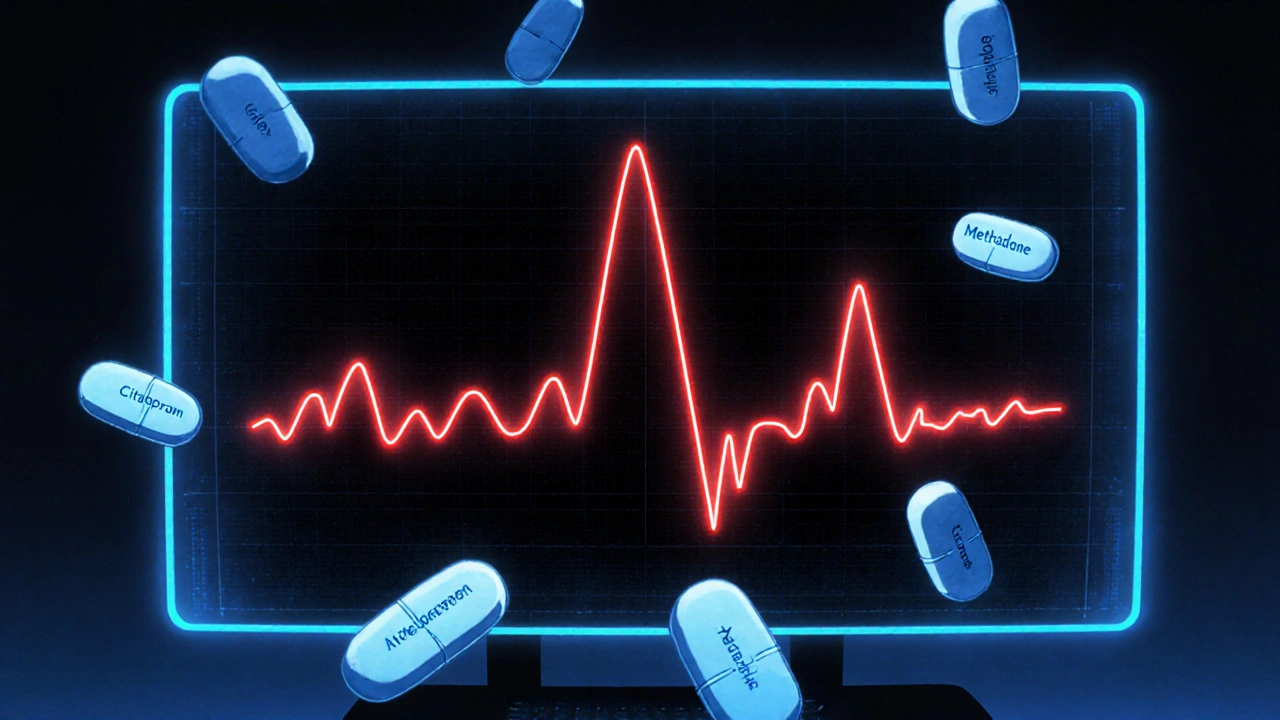Drug-Induced Arrhythmia: Causes, Risks, and Medications That Can Trigger It
When a medication changes your heart’s rhythm in a dangerous way, it’s called drug-induced arrhythmia, an abnormal heart rhythm triggered by a drug, not an underlying heart condition. Also known as pharmacologically induced arrhythmia, it’s not rare—many everyday prescriptions can mess with your heart’s electrical signals, sometimes without you noticing until it’s serious. This isn’t just about heart pills. Antidepressants, antibiotics, antifungals, even some allergy meds can do it. The most common culprit? Drugs that lengthen the QT interval on an ECG—a hidden timer in your heart that, when stretched too far, can lead to a life-threatening rhythm called torsades de pointes.
Some drugs are more dangerous than others. QT prolongation, a measurable delay in the heart’s electrical recovery phase is the red flag doctors watch for. Medications like certain antibiotics (macrolides like azithromycin), antipsychotics (haloperidol), and even some nausea drugs (ondansetron) carry this risk. Older adults, people with kidney or liver problems, and those taking multiple meds at once are at higher risk. It’s not always obvious—no chest pain, no dizziness—just a subtle change in your heartbeat you might ignore until it’s too late.
It’s not just about one drug. drug interactions, when two or more medicines combine to create a dangerous effect are a major cause. Take an antidepressant like an MAOI and add a common decongestant? That combo can spike your blood pressure and trigger arrhythmia. Even something as simple as grapefruit juice can interfere with how your body breaks down meds, letting them build up to unsafe levels. This is why keeping a full list of everything you take—prescriptions, supplements, even OTC pills—isn’t just good advice, it’s a lifesaver.
And it’s not just about what you’re taking—it’s about who you are. If you’re over 65, have heart disease, low potassium, or a family history of sudden cardiac events, your risk goes up. Some people are genetically wired to be more sensitive. That’s why doctors sometimes check your electrolytes or run an ECG before starting certain drugs. It’s not overkill—it’s prevention.
You don’t need to panic. Most people take these meds without issue. But knowing the signs—palpitations, fainting, shortness of breath, unexplained fatigue—can help you act fast. If you’ve been started on a new drug and feel your heart racing or skipping, don’t wait. Talk to your doctor. Bring your full med list. Ask: "Could this be affecting my heart?" Simple questions like that can stop a problem before it becomes a crisis.
The posts below dig into the real-world cases where meds turned dangerous—not because they were "bad," but because they weren’t used safely. You’ll find clear breakdowns of drugs linked to heart rhythm issues, how to avoid dangerous combos, what to ask your pharmacist, and which alternatives might be safer for you. No jargon. No fluff. Just what you need to protect your heart while staying on the meds you need.
Torsades de Pointes from QT-Prolonging Medications: How to Recognize and Prevent This Deadly Reaction
Torsades de Pointes is a rare but deadly heart rhythm caused by QT-prolonging medications. Learn how to recognize the warning signs, which drugs are most dangerous, and exactly how to prevent this preventable cardiac emergency.
